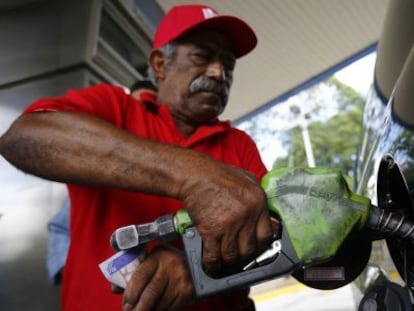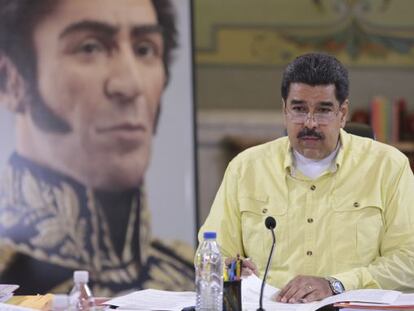Venezuela¡¯s hospitals reduced to ¡®wartime conditions¡¯
As infant mortality rates soar, doctors tell patients to bring their own medical supplies


Efraim Vegas, a doctor at the Perif¨¦rico de Coche hospital in the west of Venezuela¡¯s capital of Caracas, asks patients to buy their own gauze, antibiotics and other medical supplies. ¡°We are working in a country at war,¡± he explains.
In the traumatology ward, patients beg to be treated. But medics follow a strict triage procedure, attending the most serious cases first: it's Saturday and on weekends the staff count is low. Vegas has given Argenis Pe?a, a man with a deep wound in his leg, priority. The other dozen or so patients requiring urgent care will have to wait in the ward until Monday.
Luis Uzc¨¢tegui, a retired policeman with arthritis in his hip, says with the way things are, he has become resigned to being bedridden for the rest of his life. ¡°I have been like this for four months because when they operated the wound became infected. And since then it¡¯s just got worse,¡± he says.
In Perif¨¦rico de Coche, it's not just doctors that are scarce. Buckets of water are stored in the toilets from Wednesday to Sunday because there hardly any cleaning staff come in on those days.
All the hospitals in the capital have much the same story to tell, despite President Nicol¨¢s Maduro¡¯s promises last year that the country¡¯s dilapidated hospitals were to be upgraded and the state health service overhauled, the situation has only got worse.
Perif¨¦rico de Coche only has a few bottles of saline solution and four boxes of medicines in stock. Most of the shelves in the storeroom are empty
The crisis is due in large part to collapse of oil prices after 17 years of oil-fuelled prosperity. Now Venezuela¡¯s economy is considered by the International Monetary Fund as one of the worst in the world and, consequently, medical imports have become too costly to buy.
Perif¨¦rico de Coche only has a few bottles of saline solution and four boxes of medicines in stock. Most of the shelves in the storeroom are empty. The Venezuelan Federation of Doctors calculates that the shortfall for medical supplies in hospitals is as high as 95% while the government maintains that the shortages are temporary or one-offs.
The situation outside Caracas is worse. Carmen Maita, a small woman of 42 arrives at the Jos¨¦ Mar¨ªa Vargas¡¯s emergency unit in the West of Caracas, doubled over and clutching her belly as she cries out for a doctor. Three days ago she miscarried after discovering her husband had been murdered by a car thief in Valencia, central Venezuela. ¡°I was three months pregnant,¡± she says, ¡°but the news of my husband's death made me miscarry. I went to all the hospitals in Valencia, but none of them treated me because they had no supplies and I have no money to buy them. That's why I came to Caracas.¡±
In need of immediate attention, Maita left her two other children with a neighbor but that Friday night several other cases took priority and she had to wait more than four hours before being seen.
Teodoro P¨¦rez, a medical intern at Vargas Hospital, lists the shortages. ¡°We don¡¯t have vaporizers for asthma patients,¡± he says. ¡°There aren't many antibiotics and we don¡¯t have reagents for blood tests. There aren't even test tubes for blood analyses. Often I have had to spend my own money to help patients buy supplies.¡±
Maita has been able to buy two test tubes thanks to help from the hospital staff but the staff isn¡¯t always able to spare the cash; the salary of an average doctor working in a Venezuelan hospital is less than two euros a day.
As the situation assumes disastrous proportions, the opposition has begun to demand international intervention but the government is adamant that it will be dealt with internally. Meanwhile, in June, the Chavism-controlled Supreme Court threw out a law passed in the Venezuelan National Assembly by an opposition-led majority designed to address the health crisis.
Infant mortality
In desperation, doctors at the main maternity hospital in Venezuela, Concepci¨®n Palacios, came out in protest last Monday and, after a tussle with militiamen, ushered journalists inside to speak to patients and see the working conditions for themselves; obsolete equipment, toilets with no water or electricity, lack of food, broken infrastructure, and scant medical supplies.
Doctors say that the crisis in the health sector has caused the death of 166 newborns in this hospital alone between January and July this year, a figure that is almost double that of 2015.
In the country as a whole, the infant mortality rate rose by 0.02% in 2012 and by 2.01% in 2015. Last year, 4,903 babies died out of a total of 243,638 born, according to a report from the Ministry of Health.
Sign up for our newsletter
EL PA?S English Edition has launched a weekly newsletter. Sign up today to receive a selection of our best stories in your inbox every Saturday morning. For full details about how to subscribe, click here
Not only has Venezuela seen its infant mortality rate soar by more than 100%, Vegas says that the death toll across the spectrum is unthinkable.
He remembers the impotence he felt in November last year when he attended a teenager who arrived at Perif¨¦rico de Coche in agony with a gun wound in his leg. ¡°The bullet had punctured his femoral artery and he was about to go into shock,¡± he recalls. ¡°He was shouting to be anesthetized. I asked for a drip to keep him hydrated, painkillers and even blood for a transfusion but there was nothing. The only thing I could do was tie a tourniquet around his leg and give him some morphine for the pain while they took him to another hospital. I often think how he could have been saved but he was dead by the time he turned the first corner.¡±
English version by Heather Galloway.
Tu suscripci¨®n se est¨¢ usando en otro dispositivo
?Quieres a?adir otro usuario a tu suscripci¨®n?
Si contin¨²as leyendo en este dispositivo, no se podr¨¢ leer en el otro.
FlechaTu suscripci¨®n se est¨¢ usando en otro dispositivo y solo puedes acceder a EL PA?S desde un dispositivo a la vez.
Si quieres compartir tu cuenta, cambia tu suscripci¨®n a la modalidad Premium, as¨ª podr¨¢s a?adir otro usuario. Cada uno acceder¨¢ con su propia cuenta de email, lo que os permitir¨¢ personalizar vuestra experiencia en EL PA?S.
En el caso de no saber qui¨¦n est¨¢ usando tu cuenta, te recomendamos cambiar tu contrase?a aqu¨ª.
Si decides continuar compartiendo tu cuenta, este mensaje se mostrar¨¢ en tu dispositivo y en el de la otra persona que est¨¢ usando tu cuenta de forma indefinida, afectando a tu experiencia de lectura. Puedes consultar aqu¨ª los t¨¦rminos y condiciones de la suscripci¨®n digital.
More information










































